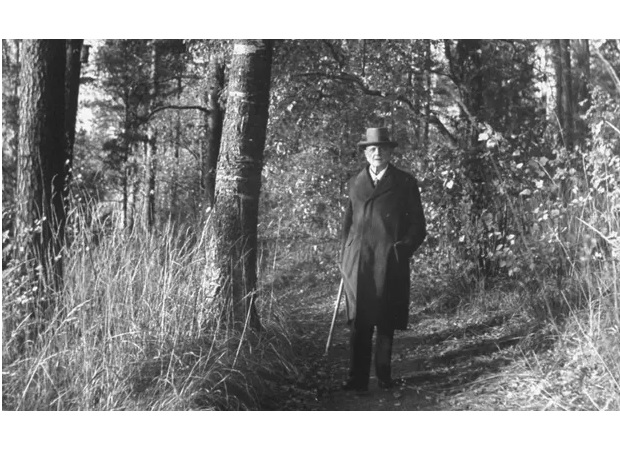Source :

Theosophy and the Society in the Public Eye
Jean Sibelius (1865 – 1957)
Published: Friday, 28 June 2013 02:56
[from HPB: The Extraordinary Life and Influence of Helena Blavatsky, Founder of the Modern Theosophical Movement, by Sylvia Cranston and Carey Williams, research assistant, 3rd rev. ed. (Santa Barbara, CA: Path Publishing House, 1999; c. 1993), pp. 496-7.]

Jean Sibelius
On the occasion of Sibelius’s ninetieth birthday, the music critic for the New York Times (December 1955) wrote:
“The interrelationship between life and art is one of Sibelius’s chief concerns. Sibelius’s identification with the fields, the woods, the sea and the sky is so profound that it has always permeated his music. . . . As a boy Sibelius wandered in the wilderness of his native province of Hame. Birds always fascinated him. “Millions of years ago, in my previous incarnations,” he once told Jalas [his son-in-law], “I must have been related to swans or wild geese, because I can still feel that affinity.””
A friend and neighbour of the Sibelius family, Mrs. Ida Sohlman, informed the writer that Sibelius spoke openly with intimate associates of his conviction in reincarnation and also of his previous lives. Independent confirmation of this came in January 1982, in a chance meeting with Harri Kallio in Santa Barbara, California, where Kallio teaches. The writer met him at the Institute of World Culture, with which he is actively associated. He told of spending some time in Finland and of a special visit made to the Sibelius family and to Yryo Paloheimo, an archaeologist who lived next door to the composer. Kallio learned from the latter that Sibelius and the circle of artists surrounding him were much involved in the study of Theosophy, as well as Rosicrucian teachings.
La fonte è per sentito dire e va presa con le pinze. Comunque …
Jean Sibelius described his working process with composition as a practice of being very very still, and the music would work itself out.
Dalla Cranston si legge :
Other composers touched by theosophy are Gustav Mahler and Jean Sibelius. Both moved in theosophical circles and held a firm belief in reincarnation (Cranston, H.P.B., 495-497).
MASONIC BIOGRAPHIES
Jean Sibelius
Born: Friday, 08 December 1865
Died: Friday, 20 September 1957
Jean Sibelius was a founding father of Finland, composer, and Freemason whose music continues to inspire humanity towards perfection.
Jean Sibelius, one of Finland’s founding fathers and proclaimed greatest composer, was born in 1865. During his childhood, Finland was occupied by Russia: a situation which many Finns rebelled against but lacked the will to overthrow. Sibelius responded by pouring his heart and soul into creativity, rather than feats of arms or strength. His compositions and music spoke to the souls of the Finnish people and helped give them a common identity to rally around for their coming push for liberation.
After Finnish independence from Russia in 1917, Sibelius was one of the pioneers who brought Freemasonry back to the country, as it had been banned by Russia for over a century. He was a founder of Suomi Lodge #1 in 1922, and used his remarkable musical talent to write new music for masonic ceremonies. His masonic musical pieces were some of his last and greatest compositions; thus, he poured his talent into the craft, and the craft inspired his talent.
Brother Sibelius’ increible musical pieces are still performed today, and his birthday is a national holiday in Finland. Music can express the national or group spirit, bringing it to life when nothing else can. For that reason, Sibelius’s compositions have left a lasting impression on the consciousness of humanity, aiding in its perfection, which is a guiding principle of Freemasonry.
https://www.good-music-guide.com/community/index.php?topic=21065.0
